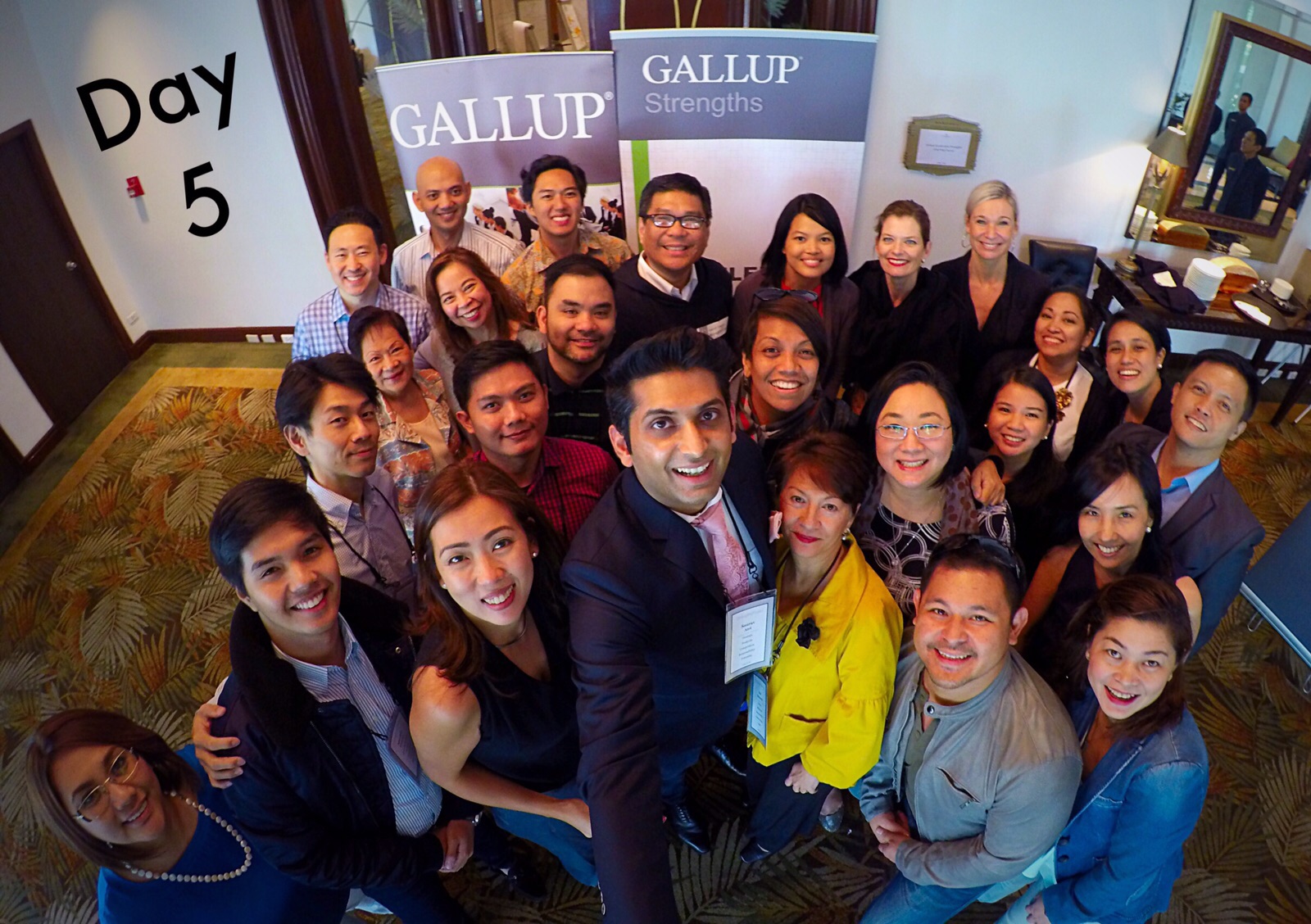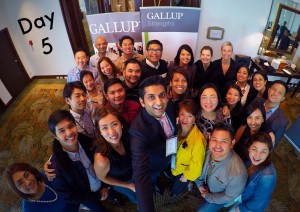Recently, I attended the first ever Gallup Accelerated Strengths Coaching Course here in Manila. And it was an inspiring and learning-filled event of the highest quality – of content, of activities, and most of all, of people.
What also excited me was the whole approach and philosophy behind Strengths, and all of the tools, activities, and learning –
That success is achieved through the effective performance of your strengths, and not improving on your weaknesses.
How many times have we been told, that in order to succeed, you had to work on your weaknesses?
That to excel in all our years of schooling, we had to work on our weakest subjects, while just maintaining our strongest subjects?
I know I have, and if your experience is similar to mine, it was painful and tedious to improve on what I naturally wasn’t good at.
I had to spend more time and pay a higher price in terms of energy and effort to reach the same results that came easily and naturally to other people.
Focusing on weaknesses can be frustrating. It’s like you’re always having to make up for something that you should have.
Instead, what about focusing on what you do have. On what feels natural, and what feels fun, those “moments of genius.”
Studying failure teaches you how not to lose, and to keep your current position and measure up to a standard others have set for you.
Studying successes teaches you how to win, and to rise and challenge yourself to greater and greater heights, and to be the best that you can be, and what you do.
Don’t play to not lose.
Play to win.
Focus on what comes naturally to you.
I was terrible at public speaking, especially in situations where there’s a huge group, and you have to meet a ton of new people at the start, and then field questions, and then meet them all again at the end. Just imagining that scene brought chills. I remember back in school, I was terrified of speaking up in front of class.
Speaking to a large groups was something I felt that was unnatural for me, but what I did notice I was good at, was in small group situations.
I loved talking and being together with just a few groups of people. I preferred being around friends, and I was more comfortable talking to people on-on-one. I asked a lot of questions, and genuinely wanted to get to know more about people. That’s what came naturally to me.
We all have skills, talents, and behaviors that come most naturally to us. It’s by focusing on these that will then give us the most results, and the most ease in achieving those results.
There’s a quote that says:
“Everybody is a genius. But if you judge a fish by its ability to climb a tree, it will live its whole life believing it is stupid.”
And we all have genius within us. We just don’t see it when we keep on focusing where we have a hard time, and with what’s lacking, what’s wrong with us.
Focus on what has worked, and what’s working.
Instead, focus on areas of strengths and successes. Look back on what has worked for you in the past, in similar situations.
What’s working for you now that you can do? Or do more of?
It’s about being aware of what your tendencies are, what you’ve got, and how you have been doing certain things.
It’s the awareness of not only what you do, but how you do, and why you do.
I realized I kept comparing myself to my peers, who were all natural speakers and presenters. They loved having a good time in front of an audience, and had charisma, timing, and the feel of it. I kept trying to copy the tricks and tactics that they were using, to little success.
When I started trying to copy them less, and started to focus and be aware of where I was good at and what came naturally to me, I felt I got better. People told me how much I had improved.
Focus on achieving the outcome.
Just because it didn’t feel natural for me to speak in front of a crowd, doesn’t mean that I won’t ever be able to do it. It’s a matter of using what you have to achieve what you want.
I felt really comfortable doing preparation, and so I did, before every presentation, these steps:
1.) I’d get clear on what the objective was of the speaking engagement.
2.) I’d go over my presentation, and ask questions about the audience. I would then adjust accordingly, and do a once-over of the material.
3.) I would think of the audience not as one big group, but several small groups that just happened to be here for the same experience.
4.) And I would talk to people directly. I’d think of everyone as a friend, and relate to them one-on-one, even in an audience setting.
5.) Lastly, I would focus on key points that I felt would be of greatest help to the audience in mind.
All of these combined allowed me to then become comfortable on stage, in front of an audience, deliver my message, facilitate learning and discussions, and have fun at the same time.
Invest in your talents, and manage around your weaknesses.
Weaknesses won’t magically vanish, but it’s also about using your talents to manage your weaknesses, making sure they don’t get in the way of your success.
Because in essence, that’s what a weakness is – an obstacle to your success.
Pour more energy and effort instead into your talents and what comes naturally to you, and you’ll reap bigger rewards.
Focus on your talents, not your weaknesses.
Develop your strengths, to get to success.
P.S. If any of you want to know more, or begin to discover your strengths, and want some help on them, feel free to message me at buildfreedom@fredriclipio.com
What’s effortless for you that has contributed to your success? Please share in the comments below!
Acknowledgements:
- To Saurav, Danny, Pia, Baby, RR, Glory, Karen, Mi-Ann, Kasper, Coach May, Bernard, Erwin, Gen, Sarah, Denise, Val, Celine, Isa, Nina, Rose, J, Martin, Migs, She, Ado, and Donna – I learned so much from all of you. Thank you so much! You’re awesome!
- Thanks Donna Boncan, for the class picture!
- Visit the Gallup website to know more about Strengthsfinder and the Strengths philosophy.


[…] How much different would our lives be if we played to, and used our strengths, instead of shoring up our weaknesses? […]